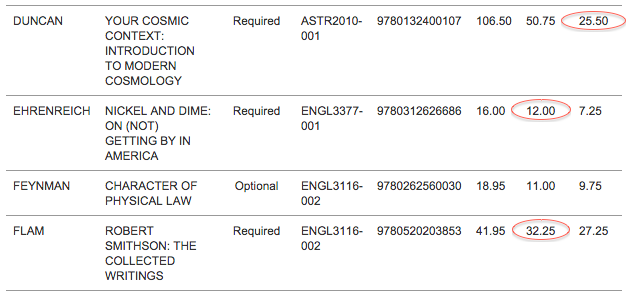
Because books are so expensive, try looking online for cheaper options. (James Bradbury/CU Independent)
Opinions do not necessarily reflect CUIndependent.com or any of its sponsors.
The CU Book Store is ripping you off.
Most returning students already know this, and choose to buy their books from outside vendors. For those of you who aren’t convinced yet the CU Book Store is an egregious scam, allow me to provide some evidence.
As an English literature major, my book list is always lengthy. Here is a screen-cap of just a few of my required books for this semester: an astronomy textbook and two books for my English classes. (Note how the third item is listed as “optional.” I don’t know anyone who actually buys their optional reading.)

I generally like to rent textbooks and buy novels or essay collections. Circled are the prices the CU Book Store would have charged me for renting my astronomy textbook and buying used versions of my English books, coming to a total of $69.75, plus tax.
When I ordered these books through used booksellers online, this is what I paid:
- “Your Cosmic Context” – $20.49 to rent on Amazon
- “Nickel and Dimed” – $2.48 + $3.99 shipping to buy used through Amazon
- “Robert Smithson: The Collected Writings” – $22.00 + $3.99 shipping to buy used through Amazon
Now my total comes to $52.95. That may be just a 16-dollar difference, but this is only a fraction of my total book list. This year I spent around half the amount the Book Store would have charged me if I had purchased my books only there.
In fact, at least four of my required books this year cost me exactly $4.00 each – $3.99 of which was for shipping. Yes, one-cent books are a thing.
The CU Book Store is convenient, to be sure. Often students add a class a week or two into the semester and need to get their books right away in order to keep up. The Book Store also allows students to decide among various used book options to make sure their quality is acceptable – a luxury online shopping doesn’t often afford.
But just because the Book Store is convenient, doesn’t mean it shouldn’t have to compete with other vendors. If you’re still shopping for books for the semester, try to Compare amazon product prices first. You’ll save money, and you might just force the Bookstore into rethinking its strategy of financial bullying.
Where to buy:
Why it’s better: Amazon uses ultra-competitive, sometimes cutthroat pricing strategies to ensure the world remains enslaved to it. This may be bad for the global economy, but it definitely helps your beer fund for the semester. Amazon partners with hundreds of used booksellers to offer you instant price comparison and one further layer of vendor competition that allows for the glorious phenomenon of one-cent books.
Amazon also offers a significant Amazon Prime discount for students, to the tune of $49 a year.
Drawbacks: When you buy through secondary vendors, standard shipping rates and delivery times apply. Be sure to order at least a week before classes start, and don’t forget to mentally add $3.99 while you compare Amazon’s rates to the Bookstore’s rates.
Why it’s better: Chegg specializes in competitive rental pricing. For example, “Your Cosmic Context” would have cost me $21.49 if I had ordered through Chegg – not as good as Amazon, but still significantly cheaper than the Bookstore.
Drawbacks: Shipping rates and delays also apply. It can also be a hassle to return rentals via mail at the end of the semester. Weigh Chegg rental prices and the cost of effort against Bookstore prices to determine who will actually give you the better deal.
Where to sell back:
Why it’s better: CU’s textbook buyback is a joke. Students usually walk away with just enough cash to buy a burrito. Half.com allows you to see what other people are selling your book for, so that you can decide how much of your money you want to try to get back. As an example, I accidentally bought the wrong French textbook for $32.00. I will be able to sell it back on Half for over twice that value, since other sellers currently offer it at a range from $75 to $100.
Drawbacks: Instead of just dropping off unwanted books at the Book Store, you have to treat Half.com sales like you would Ebay or Craigslist sales and send your books to buyers in a timely manner. Fortunately, the Ink Spot on campus provides a convenient and relatively inexpensive way to do this.
Other students in your major
Why it’s better: If you’re willing to hold onto your textbooks until the start of the next semester, you can make fairly good money selling to people who need them now. Post on Facebook pages or leave notes up in classrooms. All you have to do is offer a better price than the Book Store (easily done). Students are often willing to pay more than they would on Amazon if it means getting their books right away.
Drawbacks: It’s possible to strike out. Keep in mind you may not find anyone willing to buy, or they may not be willing to pay what you offer. Be flexible, and be ready to compromise.
On very rare occasions, the CU Book Store can actually offer you the best deal. But more often than not it is an unnecessarily expensive option.
Textbook-buying season is going to rip you off no matter what, but never lose hope that you can always work a defunct and broken system.
Contact CU Independent Opinion Editor Lauren Thurman at lauren.thurman@colorado.edu.
